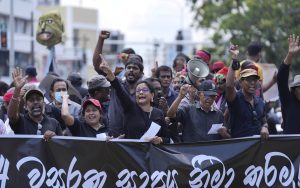Sri Lankan President Gotabaya Rajapaksa’s grip on power is slipping. On Tuesday, the ruling Sri Lanka Podujana Party (SLPP)-led coalition lost its majority in parliament, when at least 41 legislators walked out of the alliance. The coalition now appears to have less than the 113 seats it needs for a simple majority in the 225-seat Parliament.
The decline in the SLPP’s presence in parliament has been dramatic.
In the August 2020 general election, the SLPP-led coalition won a landslide victory to secure 145 seats in parliament. Defections from the opposition helped it get a total of 150 and a formidable two-thirds majority.
A month ago, it lost this two-thirds majority after the president sacked two cabinet ministers, Wimal Weerawansa and Udaya Gammanpilla, for criticizing Finance Minister Basil Rajapaksa, the president’s younger brother, for his handling of the economic crisis. Simmering tensions in the ruling coalition bubbled, fissures came to the fore, resulting in smaller coalition allies and SLPP parliamentarians pulling out support.
Early this week, the SLPP’s strength in parliament fell below the half-way mark. The government is now struggling for survival.
Meanwhile, out on the streets of Colombo and other cities, Sri Lankans are calling for the resignation of both the president and his older brother, Prime Minister Mahinda Rajapaksa. Other members of the Rajapaksa family, including Basil; Irrigation Minister Chamal Rajapaksa, another brother; and Sports Minister Namal Rajapaksa, the prime minister’s son, resigned early this week.
But that hasn’t calmed the protests. Gotabaya and Mahinda remain at the helm and there are several other members of the clan heading government departments and corporations. The Sri Lankan people want the Gotabaya government and the entire clan to go.
“I don’t want anyone from the Rajapaksa family to be in power. Not even their cat,” The Hindu quoted an angry woman participating in a protest in Colombo on Sunday as saying.
For several months now, Sri Lanka has been battling its worst economic crisis in seven decades. The island’s foreign exchange reserves are severely depleted, brought on by financial profligacy of successive governments and mounting debts. Even as it was struggling to deal with its debts, its tourism-dependent economy was hit hard, first by the 2019 Easter bombings that kept tourists away from the island and then the COVID-19 pandemic, which forced it to shut its borders.
Despite some financial support from India and China, the crisis on the island has not eased. There is a severe shortage of food, fuel, and medicines. Prices are spiraling. Frustration and anger has bubbled onto the streets.
Amid escalating mass protests against his government’s mishandling of the crisis, President Gotabaya declared an emergency on Friday, April 1. A day later, he declared an island-wide, 36-hour-long curfew that was reportedly aimed at preventing a protest campaign scheduled for Sunday, to call on the president to step down.
Nothing has gone right for the president in recent days. The protests have shown no sign of letting up. In fact, the curfew triggered a surge in protests across the country.
Then, Gotabaya’s entire cabinet, except his brother Mahinda, resigned on Sunday. A desperate Gotabaya reached out to the opposition. He invited all parties “to come together to accept ministerial portfolios in order to find solutions to this national crisis.” However, the opposition parties have rejected his appeal.
“The people of this country want Gotabaya and the entire Rajapaksa family to go,” Samagi Jana Belawegaya (SJB) leader Ranjth Madduma Banadara told the Associated Press. “We can’t go against the people’s will and we can’t work alongside the corrupt,” he added, rejecting the President’s call to the opposition to form a unity government. The SJB has 54 lawmakers in parliament.
Ali Sabry, who was appointed to replace Basil as finance minister, quit within 24 hours.
Gotabaya has said he will not step down. However, he said he would handover the government to whoever proves majority support in parliament.
Late on Tuesday night, Gotabaya revoked the emergency. Without a majority he would not have been able to get it ratified in parliament. The decision also seems aimed at mollifying angry parliamentarians and calming protests on the streets.
The Rajapaksas are desperate to hold on to power. The clan is not known to give in easily and can be expected to resort to authoritarian measures, including violence, to hang on to power.
On Tuesday night, Nirupama Rajapaksa, a former deputy minister and Gotabaya’s niece, who is being probed for corruption – she and her husband were mentioned in the Pandora Papers as owning a shell company and vast properties abroad – left the country for Dubai.
Will other Rajapaksas follow?
































